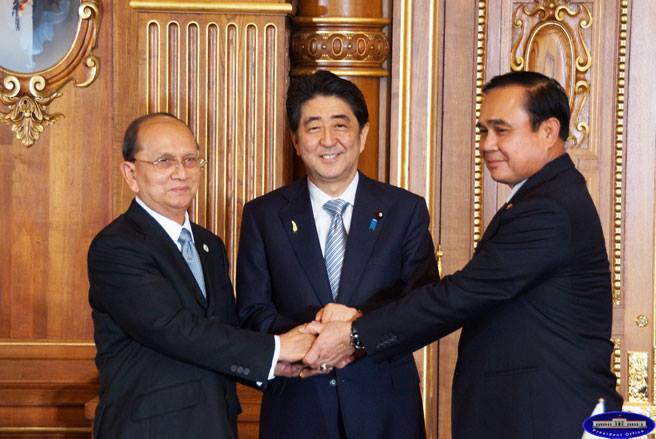Thailand, Japan and Burma on Saturday effectively launched the US$50 billion Dawei special economic zone by signing an agreement in Tokyo that will have a deep impact on trade and investment in Southeast Asia.
Thai Prime Minister Prayut Chan-o-cha and Japanese Prime Minister Shinzo Abe both said the signing of the tripartite pact will boost the economic partnership between Japan and ASEAN.
Gen Prayut and Mr Abe held talks on Saturday after senior government officials of the three countries signed the memorandum on tripartite cooperation to develop the Dawei project as Burmese President Thein Sein looked on.
The signing came on the sidelines of a summit in Tokyo between leaders of Japan and the Mekong nations — Cambodia, Laos, Burma, Thailand and Vietnam — at which Japan pledged financial aid worth US$6.1 billion to the five Southeast Asian countries.
The largest of its kind in Southeast Asia, the Dawei project in Tavoy, southeastern Burma, will include a deep-sea port with the capacity to hold 250 million tonnes of cargo; an economic zone that will cover more than 200 square kilometres; factories; a coal mine and power plant for electricity; and golf courses and five-star hotels for visiting executives.
Dawei is projected to become the major gateway for the Mekong region’s trade with India, the Middle East and Africa, while linking Burma by road to Thailand, Cambodia and southern Vietnam.
“I’m convinced the signing of a memorandum of intent on the Dawei Special Economic Zone will create an opportunity to strengthen the economic partnership between Japan and ASEAN and Japan and Thailand ahead of the launch of the ASEAN Economic Community,” Mr Abe said in a joint news conference with Gen Prayut after their meeting.
When completed, the 200-square-kilometre economic zone “will become a new distribution centre for the world”, Gen Prayut said.
[related]
Under the Dawei agreement, the three countries will hold equal shares in Dawei SEZ Development Co, which will operate the project. Dawei SEZ was established to manage the Dawei project and initially it was an equal partnership between Thailand and Burma, officially known as Myanmar.
The Thai and Japanese prime ministers also welcomed recent agreements between both countries to develop the Bangkok-Chiang Mai high-speed railway and the mass transit system in Thailand.
Gen Prayut said he “highly values” Japan’s initiative in promoting “quality infrastructure investment” in Asia, and promised to take measures to improve the investment climate in Thailand.
The number of Japanese companies investing in Thailand rose to 1,552 in June 2014 from 1,379 two years earlier, according to Japanese data.
The two leaders agreed to launch a regular dialogue between the two countries on cooperation in agriculture, Mr Abe said, without elaborating.
He also expressed hope Thailand will establish a stable political system after restoring democracy, and Gen Prayut said his country is undertaking serious efforts to achieve national reconciliation.
Gen Prayut said Thailand will continue to work to strengthen ties with Japan in the security field.
Earlier, Gen Prayut told Japanese investors at a lunch that the Thai government had approved funds of 4.5 billion baht (US$140 million) to develop transport infrastructure to link Dawei to the Eastern Seaboard and Cambodia and Vietnam.
This article was originally published in the Bangkok Post on 5 July 2015.



